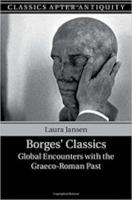
CUP (2018) h/b 174pp £75.00 (ISBN 9781108418409)
In Jorge Luis Borges’ 1981 short story ‘The Plot’, a gaucho—an Argentinian cowboy – is set upon by other gauchos. As he falls to the ground, he recognises the face of one of his godsons among his attackers, and says, with mild reproach and slow surprise, ‘¡Pero che!’ —untranslatable into English, but something like ‘Come off it!’ Borges continues: ‘He dies, and he doesn’t know that he’s dying to repeat a scene.’
This episode, one of many discussed by J. in this fascinating study, neatly exemplifies some of the recurring themes in Borges’ reception of the classics. Like the assassinations of Lincoln and JFK, which Borges had considered in similar vein in a piece from nearly twenty years earlier, this death echoes that of Caesar, mediated via Plutarch and Shakespeare. However, this echo is not merely a case of evoking the past or dressing up modern events in ancient terms, but of past events and archetypes compelling people to repeat them. As Heraclitus, one of Borges’ touchstones, indicated, time flows unstoppably but irregularly; past, present and future are all connected and yet different, and only from this perspective can we properly understand our relationship to the classics.
As the Caribbean poet Derek Walcott remarked, for Borges the death of the gaucho does not merely repeat, but is the death of Caesar. The classical echo inscribes the culture of the New World into the western tradition, and at the same asserts the right of a new ‘global’ classics to commandeer that tradition without apology or obligation. Borges does not hold the cynical view that everything of cultural importance has already happened, nor does he promote cringing obeisance to (European) tradition and authority. Rather, he experiences these echoes as a constant renewal, that also refigures the classical past in more global, heterogeneous terms. It is repetition and reinvention, just as, in arguably his most famous piece, he argued that Pierre Menard, the 20th-century author of Don Quixote, wrote an entirely different novel from Miguel de Cervantes’ 17th-century original although he used exactly the same words.
Borges’ classical reception, like all his work, is complex, allusive, mysterious and playful. He embraces the inevitably fragmentary nature of our knowledge of ancient culture, observing, in his thoughts on memory, that if we knew everything we might then understand nothing. At the same time, he recognises the lure of the encyclopaedic, the scholarly obsession with the recovery of lost texts and the deciphering of riddles, and of course the idea of the Library of Babel that contains a copy of every book ever written, even the lost works of Tacitus (though we wouldn’t necessarily be able to find what we’re looking for without a catalogue that may or may not exist).
J. offers one thread to lead us through this labyrinth, focusing her discussion partly on Borges’ reception and representation of key authors like Homer and Vergil, and partly on recurring themes like time, memory and absence. Other threads could be followed through this literary garden of forking paths, and would lead us somewhere else. She offers an interpretative reading of selected texts and poems, rather than a complete account of Borges’ approach to the classics, let alone his entire literary oeuvre. For a giant of 20th-century modernism Borges is very accessible, and the works she quotes such as ‘The Aleph’, ‘The Maker’, ‘The Garden of Forking Paths’, ‘The Immortal’, ‘The Library of Babel’, ‘Pierre Menard, Author of the Quixote’ will enable the reader to engage with J.’s thought-provoking analysis of Borges’ readings of classical texts and themes, and the wider implications for a new global classics.
My main complaint is that there is no index of the poems and stories discussed; this is especially infuriating as such information is provided for the works of Borges’ successors like Calvino and Eco who are discussed briefly in the final chapter. Is the index a Borgesian joke, being both perfectly accurate and entirely useless as a means of identifying specific points without having to read the whole book …?
Neville Morley
